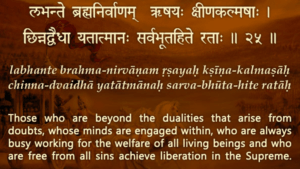
By Chaitanya Charan Das
Bhagavad-gita 5.25
Suppose someone is starving. We may help them by giving some money. If they are starving because a recession has left them jobless, they will gratefully use that money to feed themselves. But if they are starving because they are alcoholics who waste all their money on drinks, they will probably do the same with our money.
Similarly, consider a jobless person living on welfare. If the welfare money enables them to survive while they are trying to get another job, that aid will be helpful. But suppose the welfare money takes away their impetus to look for another job; instead, it facilitates them to stay on welfare lifelong while wasting their life on trivial or self-destructive activities. Then, that aid will be harmful.
While helping the deprived, we need to consider why they are deprived. Pertinently, the Bhagavad-gita states that the pure-hearted engage in the welfare of all (05.25). How does this verse relate with our discussion? In two major ways. First, it underscores that purity of heart makes us more helpful. While most people may not help others because of their impurities of greed and selfishness, those who do help may not help effectively because of their impurities of naivete or sentimentality — these obstruct them in analyzing the cause of deprivation.
Second, the Gita verse underscores that while helping others, we need to strive in parallel for purity by appropriate spiritual processes. Being thus purified, we will offer more holistic help. How? We will provide the deprived not just outer resources such as money but also inner resources such as spiritual insights and transformational practices that will empower them to become pure. Thus, we can do our part in ensuring that our help actually helps.
Post view 360 times


